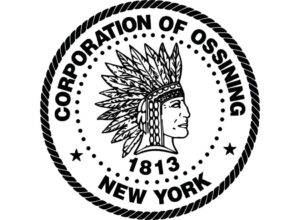 A group of twenty-three community leaders in Ossining has petitioned the Village Board of Trustees, seeking a seat at the table in the process set forth by Governor Cuomo’s Executive Order 203, the New York State Police Reform and Reinvention Collaborative.
A group of twenty-three community leaders in Ossining has petitioned the Village Board of Trustees, seeking a seat at the table in the process set forth by Governor Cuomo’s Executive Order 203, the New York State Police Reform and Reinvention Collaborative.
The leaders were responding to a decision by the Board of Trustees to enter into a contract with the International Association of Chiefs of Police (IACP) to serve as facilitators for the Collaborative process. At a meeting with Mayor Gearity on September 1, NAACP President Aaron Moore expressed frustration that the Village had issued a request for proposals and selected a facilitator without involving community stakeholders in the process.
“The Village rushed out the RFP with a two week deadline for proposals. The decision to select the Police Chiefs to guide the police reform process appears to be a serious conflict of interest,” Moore said. “Officer accountability is the key change we need at the Ossining Police Department. Will having a police organization in charge of reform address that need?”
At the September 1 meeting, Mayor Gearity agreed to allow the group to review the IACP proposal and the proposals of three other groups who applied for the position. The letter sent by the community leaders on September 9 (reproduced below) recommended that the Board consider the application of Matrix Consulting Group and asked to be a part of the interview process in reconsidering the initial selection of IACP.
In addition, the group asked that the Mayor appoint a Collaborative Advisory Committee to guide the process and create the plan for reforming the Ossining police that is required by Executive Order 203.
Pastor Shaun Jones of the Star of Bethlehem Baptist Church, one of those signing the letter, emphasized the importance of community involvement in the process. “The Ossining police interact with dozens of ethnic and cultural communities,” he said. “Communities of color and the Ossining police Department already have a strained relationship. The Village can begin to bridge the divide by listening to the expressed needs and feelings of the black and Hispanic community that believe that a true reform process may be the difference between life or death for our sons and daughters after an interaction with the police.”
“Without the trust of the community, no reform process can be effective,” said Bishop Joan Whittaker, Pastor of HORAC Ministries. “I hope the Village will do the hard work necessary to engage the people who have the greatest stake in a police force that is effective and respectful of the community it is sworn to protect.”
Jerry Smith, former Ossining NAACP President, pointed out that past efforts to enact reforms have fallen short. “Will the end product of this process be a rehash of previous recommendations for sensitivity training and support for officers’ mental health needs?” he asked. “Unless there is an emphasis on transparency and accountability for police actions, there will not be any real change in the dynamic between the police and African American residents of Ossining.”
Moore, the Ossining NAACP Branch President, detailed the sort of fundamental changes that the group wants the Police Reform and Reinvention Collaborative to consider. In addition to officer accountability, these include a policy for the use of force, demilitarization of the department, officer body cameras, empowerment of the Civilian Police Complaint Review Board, privacy protections, and transparency in the department’s budget, hiring, and promotion policies.
“The response of the Village to Executive Order 203 is an opportunity to address severe problems of bias and systemic racism in policing that have existed in our country for many decades,” the leaders wrote in their letter to Village officials. “It is an opportunity to begin a process of reform and reinvention that is not likely to present itself again in our lifetimes. Ossining can, in its own way, lead the way by engaging all stakeholders and winning buy-in from everyone affected by our local system of law enforcement. The Board must recognize that this will be a difficult process whose success cannot be taken for granted. Involving stakeholders in every aspect of the process is an essential component of building a robust and lasting Collaborative.”
Letter sent by the community leaders:
September 9, 2020
The Honorable Victoria Gearity, Mayor
The Honorable Rika Levin, Deputy Mayor
The Honorable Robert M. Fritsche, Trustee
The Honorable Omar Lopez, Trustee
The Honorable Manuel Quezada, Trustee
cc: Karen D’Attore, Village Manager Village of Ossining
SUBJECT: Ossining’s Response to Executive Order 203
Dear Mayor Gearity and Honorable Members of the Village of Ossining Board of Trustees,
Thank you for providing our group the opportunity to offer feedback regarding the selection of a consultant to facilitate the Village’s response to Governor Cuomo’s Executive Order 203, the New York State Police Reform and Reinvention Collaborative. During our meeting with Mayor Gearity, Village Manager Karen D’Attore and Corporation Counsel Stuart Kahan (joining by phone) on September 1, 2020, we asserted our strong belief that community stakeholders must be involved in every stage of the Collaborative process, including planning, gathering community input, drafting proposals, and presenting recommendations to the Board of Trustees for its consideration and ratification.
After carefully reviewing the consultant proposals that were provided to us on September 4, 2020, we arrived at a consensus that the proposal from Matrix Consulting Group (MCG) provides a credible alternative to the proposal by the International Association of Chiefs of Police (IACP) that was initially favored by the Board of Trustees. We believe that there are aspects of the Matrix proposal that are superior to IACP’s approach, and we ask that you take steps to reconsider your decision to select IACP, including an interview with MCG in which stakeholder representatives may participate. Our group’s preference for MCG is explained later in our response.
We further ask that once a facilitator is chosen, the Mayor appoint an ad hoc Collaborative Advisory Committee to work with the facilitator to guide the process outlined in the New York State Police Reform and Reinvention Collaborative Resources and Guide for Public Officials and Citizens (the Workbook). The section of this document entitled “Suggested Work Plan Phase 1: Planning (August/September 2020)” includes the following instruction:
“Convene key stakeholders: Identify local leaders who can work closely with you to facilitate conversations with key constituencies in the community.” (Page 112)
This language clearly implies that local leaders should be involved in every phase of the process. The appointment of a Collaborative Advisory Committee to satisfy this requirement should involve one or more representatives of the stakeholders identified in the section of the Workbook entitled “Key Organizing Principles: Bring your Community to the Table.” The Governor’s Executive Order specifically requires an inclusive, open, and transparent process. On page 110 the Order identifies some of the key stakeholders who must be involved:
* Membership and leadership of the local police force
* Members of the community, with emphasis on areas with high numbers of police and community interactions * Interested non-profit and faith-based community groups
* The local office of the district attorney
* The local public defender
* Local public officials.
Members of our group would be happy to recommend possible members for appointment to an ad hoc Collaborative Advisory Committee.
Regarding our group’s recommendation of Matrix Consulting Group to serve as facilitator of the process, we believe that MCG was responsive to the RFP in addressing the three components stated in the project scope:
1) Police Department interviews and material review: MCG set forth a detailed plan to collect and analyze information using successful methodologies from their service to previous clients in order to thoroughly evaluate our local police department.
2) Community Engagement: The set of questions presented in the MCG proposal addresses many of the problems in policing that plague our Community. According to Executive Order 203, these problems include “racially-biased law enforcement, discrimination and mistreatment of African-American citizens, and the lack of accountability for the unlawful actions by law enforcement officials.”
MCG demonstrates a commitment to shape public trust by involving “community leaders throughout the entire process in order to maintain legitimacy and trust” (Page 17). The firm proposed thoughtful questions that would cover “a range of views on policing in the Village of Ossining” (Page 14), again developing a foundation for trust to develop between law enforcement and the community. MCG also acknowledges the legitimate interests of the police department in producing a plan that protects the safety of officers and allows them to promote safety and security in the Village.
Finally, MCG indicates that they would work with the Village to identify local resources to provide Spanish language interpreters throughout the process, a goal that would also be addressed by appointment of Spanish speaking stakeholders to an ad hoc Collaborative Advisory Group.
3) Plan development: MGC put together a team of experienced law enforcement officers and analysts to assist the Village in the Police Reform and Reinvention Collaborative, including an attorney who served on the Civilian Complaint Review Board in New York City as well as a team member who is also a member of the International Association of Chiefs of Police (IACP). In addition, the President of the firm made a commitment to provide personal oversight of the firm’s services.
We urge the Village to seriously reconsider its selection of a facilitator for the Collaborative and to consider the arguments presented here in support of the proposal from Matrix Consulting Group.
The response of the Village to Executive Order 203 is an opportunity to address severe problems of bias and systemic racism in policing that have existed in our country and village for many decades. It is an opportunity to begin a process of reform and reinvention that is not likely to present itself again in our lifetimes. Ossining can, in its own way, lead the way by engaging all stakeholders and winning buy-in from everyone affected by our local system of law enforcement. The Board must recognize that this will be a difficult process whose success cannot be taken for granted. Involving stakeholders in every aspect of the process is an essential component of building a robust and lasting Collaborative.
The Guide for Public Officials and Citizens states: “Your most important task in this Collaborative is to ensure a healthy, productive engagement and fostering a relationship of mutual trust between the police and the community – including all segments of the community.” (Page 109) By inviting our group to offer feedback on the selection of a facilitator for the process, however late it was in coming, the Board of Trustees has made a good faith gesture toward fulfilling the goal of full participation by stakeholders in the process. The appointment of an ad hoc Collaborative Advisory Group is a necessary step in converting this good will into a durable commitment to create a process that will result in robust reform of policing in the Village of Ossining.
Thank you for your consideration,
Melissa Banta, Ossining NAACP Member
Kendall Buchanan, Chairmen of Ossining Sankofa Homecoming
Joyce Cole, Ossining Resident
Cooper Conway, Priest-in Charge Trinity & St. Paul’s-on-the-Hill Episcopal Church
Althema Goodson, Community Advocate
Omar J Herrera, Former Village Board Member
Kim L. Jeffery, Community Advocate
Shaun Ellison Jones, Pastor, Star of Bethlehem Baptist Church
Diana Lemon, Community Resident & Ossining NAACP Member
Sheila Massengale, Ossining leader, Community Voices Heard
Sandy Mcallister, Co-Chair, Equity Taskforce, Town of Ossining
Martin McDonald, Community Advocate
Lisa Merritt-Smith, Pastor, Full Gospel Tabernacle Inc.
Aaron Moore, President, Ossining Chapter of the NAACP
Dr. Mary Phifer, Pastor, Holy Spirit Church
Kemi Pogue, Director, Community Action Program
Lisa Rudley, Ossining NAACP Member
Jeniffer Rodriguez, Pastor, First Presbyterian Church of Ossining
Jermaine Smith, Founder, Westchester Youth Bureau Advisory Board
Ann Smart, Licensed Mental Health Counselor & Ossining Resident
Shurla Turkuru, Chair, Ossining Parents Advocating Collectively for our Children
Francine Vernon, Community Advocate
Bishop Joan Whittaker, Pastor, HORAC Ministries






